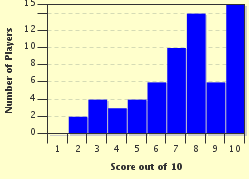Quiz Answer Key and Fun Facts
1. According to Exodus 19:20, who heard the voice of God commanding him to go to the top of a mountain to receive the law? (Exodus 19:20)
2. It's incredible, but according to 1 Kings 19:11-16 a man heard a "still small voice" after a major wind which was followed by an earthquake which was followed by a massive fire. Who heard the still small voice?
3. According to 2 Samuel 19:34-35, what elderly man claimed he was unable to hear the voices of singers?
4. Scripture tells of Samuel, while a child, hearing a mysterious voice three times in one evening and each time going to Eli the high priest and judge of Israel. The fourth time, Samuel figured out who was talking to him. Whose voice did Samuel hear? (1 Samuel 3:1-21)
5. The following verse is from an Old Testament book of prophecy: "For thus says the LORD: 'We have heard a voice of trembling, of fear, and not of peace'." In what book do you find the verse?
6. According to Acts 7:60, who cried out with a loud voice, "Lord, do not charge them with this sin," just before he was killed?
7. According to Scripture, ten lepers "lifted up their voices" to Jesus and He healed them. Out of the ten, how many returned to give thanks? (Luke 17:12-14)
8. According to Matthew 3:17, Jesus was being baptized by John the Baptist when a voice came from heaven, saying, "This is My beloved Son, in whom I am well pleased." Where did the incident take place?
9. According to Mark, what blind man shouted out in a loud voice to get Christ's attention?
10. According to John 11:43, Jesus commanded a dead man in a loud voice to come out of a tomb. What was the dead man's name?
Source: Author
Cowrofl
This quiz was reviewed by FunTrivia editor
looney_tunes before going online.
Any errors found in FunTrivia content are routinely corrected through our feedback system.

